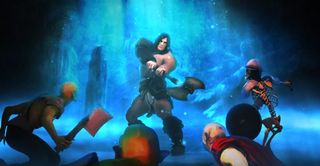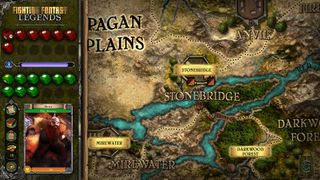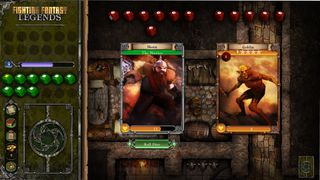Ian Livingstone and Nomad Games on bringing a classic choose-your-own-adventure series to PC
This summer Fighting Fantasy Legends revives a 35-year-old phenomenon in digital form.

Ian Livingstone and Steve Jackson's renowned Fighting Fantasy game book series first launched its debut entry The Warlock of Firetop Mountain in 1982. In-line with its 35th anniversary later this year, Nomad Games—the studio behind Talisman Prologue and Talisman Digital Edition—is working on a digital incarnation named Fighting Fantasy Legends that hopes to emulate the treasured choose-your-own adventure style of the original run.
Ahead of its launch in "late June/early July", I caught up with series mastermind Ian Livingstone and Nomad's Carl Jackson to find out more about Fighting Fantasy Legends: what it's about, what it hopes to achieve, and how it caters to both nostalgia and modern expectations.

Ian Livingstone CBE co-founded Games Workshop, co-created and co-authored the original Fighting Fantasy game book series and has worked in the videogames industry for over 30 years. He was an integral part of Eidos Interactive's rise to notoriety in the '90s, contributed to 2007's Tomb Raider: Anniversary and was named 'Life President' of Eidos in 2009.
PC Gamer: The original Fighting Fantasy book series is 35 years old this year. Why now for a videogame interpretation?
Carl Jackson: The opportunity was too good to turn down, really—it's a fantastic brand with great heritage and a great bunch of fans. Nomad Games is almost six years old and in that time we've built up quite a bit of experience with dealing with slightly more mature licenses, shall we say. Something that's already recognised and with our experience with Talisman we thought this would be a great thing for us to look at. Why now? It's a great year to be involved with Fighting Fantasy with its 35th anniversary and potential new things coming out too. Yeah, it was too good to miss.
Ian Livingstone: From my point of view, I was clearly well aware of Nomad and what a great job they'd done with Talisman and having originally signed Talisman back in the day, I was very pleased with how true they were to the game and the brand itself. I thought Nomad would be a perfect fit for Fighting Fantasy and I also thought the system they wanted to use—a card-based system for upgrading the dice—would be perfect because that hadn't been done before. Having been in the videogames industry myself for going on 30 years I've always wanted the opportunity to work with somebody who was going to really value the brand and who were passionate about the game and the Fighting Fantasy books in their youth and could reimagine it in a digital format. There have been app versions for iOS and Android and more recently a game on Steam but this is new and really exciting and I can't wait for it to come out.
Nomad found much success with Talisman Prologue and its Digital Edition multiplayer follow-up. With Hearthstone, The Witcher 3's Gwent going standalone, and The Elder Scrolls Legends—videogame interpretations of card-based games are becoming increasingly popular. Why do you think this is?
Carl: Personally, I just think card games over the last 20-30 years have become really polished and really interesting—people are finding new ways to present simple rules but with great depth and strategy. Although Hearthstone and The Elder Scrolls Legends are pure card games only, Fighting Fantasy Legends it feels more like a board and card and dice game, using elements of all of those. There's a deck of cards that you draw randomly from that have events on the cards which are similar to the events of the books—which could be monsters or treasures. I think the resurgence of card games attached to existing brands is great for us. It's a shame The Elder Scrolls have just pinched the Legends thing just before we came out but I've played all of those games quite a lot and have really enjoyed them. It's hard to say why they've had a resurgence recently but it's a good thing, that's for sure.
The biggest gaming news, reviews and hardware deals
Keep up to date with the most important stories and the best deals, as picked by the PC Gamer team.
Ian: There's been a resurgence in board games in general, I think card games and board games have been given an opportunity to resonate with a much wider audience. I think this is another great example of that opportunity manifesting itself and as Carl says Fighting Fantasy is not just a collectible card game, it's part of exploration and going through those worlds in a very innovative way.
How have you, Ian, worked with Nomad in this process—what's your relationship like with the team?
Ian: It's been a pleasure to work with them. They're fans of the series themselves, you can see their knowledge and enthusiasm shining through, there's not been any arguments that I can recall, it's all been like minded people working together, trying to emulate the playability of the books. We want them to be very accessible and these are very accessible. You mentioned Talisman being accessible, I would argue Fighting Fantasy Legends is even more accessible than Talisman is. We're looking forward to continuing what is a great relationship, and I have to say it's been great not having to tell Nomad what Fighting Fantasy is—they know instinctively and intuitively what the series represents to its readers and to us of course.
Fighting Fantasy Legends is inspired by City of Thieves, The Warlock of Firetop Mountain and Citadel of Chaos—why were these stories singled out in particular?
Ian: From my point of view, The Warlock of Firetop Mountain had to be in because that's the very first book, it's the one that's synonymous with the whole series, it's well-known—not just in the UK but the Fighting Fantasy series sold nearly 20 million copies and was translated in over 35 languages. Every country should know about The Warlock of Firetop Mountain. Citadel of Chaos—that's one of Steve's favourites, and from my point of view with City of Thieves, everyone appears to love going to Port Blacksand and it's probably the first or second most popular Fighting Fantasy gamebook. Deathtrap Dungeon and City of Thieves are pretty much the same. It's a perfect entry point to have those three, one that Steve and I wrote together, and one each of our favourite books.
One thing I loved about Talisman's videogame incarnation was that it was very accessible. How difficult is it adapting something like Fighting Fantasy to create a videogame?
Carl: Well, making a good videogame isn't easy. There's been an awful lot of research from my part anyway, trying to make sure we create something that the fans will enjoy. It's such a long-standing brand and we need to make sure we treat it with respect. I think one of the things that we have learned from Talisman is that sometimes making a game that's too complicated is a bad thing. Some people love that but some people don't love it. Talisman can be quite complicated even though it seems like a fairly simple set of rules, when you dig down there are certain cards interacting with other cards which can become a bit confusing for some players. We took all the things we learned from that and made a really nice set of rules for this game which players will be able to understand. It's been difficult at times but it's also been a great game to work on and I've really enjoyed it.


Carl Jackson is the design director of Nomad Games Ltd. who, in 2012, launched Talisman Prologue—a single-player videogame version of Games Workshop's Talisman board game. Two years later, Nomad released a multiplayer version of the game called Talisman Digital Edition and the studio is now working on the incoming Fighting Fantasy Legends.
Those familiar with the original Fighting Fantasy series will undoubtedly be excited here, however how do you attract new players who are new to the Fighting Fantasy series?
Carl: Em… that's a good question.
Ian: Well, while you think about that, let me just say: the starting point is that it has to be a great game, it has to standalone on its own two feet. This absolutely does. As a player I've been really enjoying the playtesting part of this and it's a very compelling experience. You really do feel like you're wandering through Port Blacksands from City of Thieves, or you're wandering through Firetop Mountain. There's a lot of tension, the combat and exploration—it's a great game and the fact that you've got a Fighting Fantasy license on top of that and I think that of course makes it more appealing to the people who're familiar with the genre and series. But if you're not, you're in for a great time anyway.
Carl: Yeah, it's a really accessible game too and I don't think it relies on any background knowledge of the series at all. Fans of the genre or newcomers will enjoy it all the same but there are quite a few nods in there and hints at things Fighting Fantasy fans will like, but there's no exclusivity either. Everyone can enjoy the game.
We built up quite a big audience with Talisman now, I think we've sold over half a million units-worth of things, whether that's the game of the expansion packs. We have quite a big social media following too - we will be gathering all of those people together. The response so far to the one teaser trailer that we've done and a few screenshots has been really positive. There's a lot of excitement building.
How far along is the game at the moment?
Carl: I would say about 80 percent complete. Most of the content is in there now, we're just reaching the polishing phase and we've got testing coming up as well. We're looking at all the end-of-the-line development things such as translations and achievements and all that sort of stuff. There's an awful lot of content, as well as just playing through the three books that we've mentioned there's also collecting the codex of monsters you need to fill up by wandering the world and exploring locations to find where these monsters are.
The character has a set of titles to unlock which are also like achievements—so your character can be the brave or the dragonslayer or the lucky, depending on your actions. There's lots of little things like that that we've adding in recently that make the game much more fun. It's about 80 percent complete and we're looking to have it finished late June/early July is the current guess.
It seems like Fighting Fantasy is cut out to be a videogame. Are you surprised it's taken this long to come to be?
Ian: I am! There was Deathtrap Dungeon on PlayStation One and PC back in 1998, but that hardly faithfully represented Fighting Fantasy as it was—it was more of an action dungeon bash, the role-playing elements were stripped out because of the development problems the studio had. It was never the game I wanted it to be and the apps, while they're excellent, they've essentially been a straight port of the books. Here, we're really able to get into the essence of Fighting Fantasy and reimagine in digital form the way it should be.

The starting point [when attracting new players] is that it has to be a great game, it has to standalone on its own two feet. This absolutely does.
Ian Livingstone
I imagine you're taking it one step at a time, however, given the scope of the series if this round does well might we see more games in the future?
Ian: We're planning on that. We hope the fans like Fighting Fantasy Legends as much as we are enjoying playing it at the moment. Clearly there's quite a lot of reference content out there, the many books that we wrote and the worlds that we created, there's a huge amount of source material that already exists.
Why has Fighting Fantasy survived the test of time?
Ian: It's quite extraordinary that here we are, 35 years on and we're talking about Fighting Fantasy with so much excitement and energy. For me it's an absolute pleasure that the children who played them in the 1980s are now grown up and almost go back to childhood memories when they talk about Fighting Fantasy, plus many of them have their own children now and share the experience with their kids. Normally kids reject anything that their parents say is good but I'm delighted to say that Fighting Fantasy resonated with today's kids as it did in the '80s and they're empowered by the opportunity to be the hero.
Is that what makes it a good videogame, this idea of empowerment?
Ian: Exactly that—it's all about you. It's not a linear adventure or a passive experience, it's where you take absolute control and it's decision making the choice, should I go this way or that way, should I tackle it in a certain way? It's the choice and consequence of it that makes Fighting Fantasy so compelling.
There's been a complete resurgence in the genre and that's why Scholastic has signed the book series, and there's going to be a huge relaunch in the summer off the back of my new book Port of Peril and so that's going to further increase the visibility of the series and hopefully Fighting Fantasy Legends.
Carl: Yeah, in relation to the children who are now adults reading the books again with their children: we had emails from people who play Talisman with their kids and there was one guy who was using it as a bedtime story creation tool with his daughter. It was a great email and he was saying how he plays the game with her on iPad when she's trying to go to sleep and creates stories from the events of the game. It's great hearing things like that and I'm hoping this game does a similar thing where people who remember the books when they were growing up can get their kids into it too with a game like ours. It's nice to hear that side of gaming too.
Ian: Yeah, I think it's that feeling of ownership which makes them so powerful. We wrote them in the second-person present and people used to tell us about the adventures they had in the first-person—it was all about their experience. Of course, if it's all about you then it has a lot more resonance.
Most Popular

